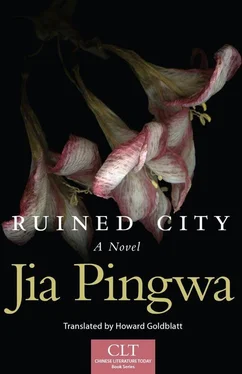Such a graceful lady, her beauty like the spring. Could it be jealous enough to snatch away her life at such a young age? She would be the clouds on Wushan and the goddess at the Luo River. I do not know where she is, and can only ask the deities .
Established on the 22nd day of the first lunar month in the first year of the Shengwu reign .
“Such beautiful prose!” Zhuang exclaimed. “It makes me wish I could have met the lady in the inscription. Years ago, when I went to the Luo River, I was reminded of ‘Ode to the Luo Fairy,’ and was so moved I cried in the wind. After reading the stele, I felt as if I had met her or that she was right in front of me. The poor lady was such a beauty, and yet she suffered terribly. It makes me sad.”
Seeing him so emotional that his eyes turned red saddened Tang Wan’er.
“Zhuang Laoshi sounds like he was reciting a Shakespearean sonnet,” she said with a pouty smile. “It’s too bad he wasn’t born back then, or she would be Mrs. Zhuang.”
Still enthralled, Zhuang said, “No, that wouldn’t happen, but I would definitely want to meet her.” He went to buy some incense and placed it in front of the stele, making Wan’er even more jealous.
“Zhuang Laoshi is such a romantic soul,” she said, “that the lady could sense that even after death. But there are so many great women, in ancient times, now, and in the future. Zhuang Laoshi could not have been born in ancient times; nor can he live long enough into the future. Even now, pretty women are as numerous as the clouds, so which one will he love?”
Zhuang blushed at her words, suddenly realizing that he had been too caught up in the beautiful tale and had said too much. Music sounded at that moment, drawing all the worshippers and tourists away from the hall to the entrance.
“Hurry, Mother. The abbess is going to assume her position,” a woman shouted shrilly.
The three of them followed along, wondering how Huiming would make her entrance. They saw a fat-faced, big-eared monk in a red cassock who was holding a jade tablet and chanting as he walked to the front. Behind him a nun carried an image of Buddha, and another was banging on a wooden fish, followed by four younger nuns in two rows with lotus lanterns. Then came Huiming, draped in a gold-foiled cassock and wearing a pair of black cloth shoes with slightly elevated heels. With a solemn expression, she looked serene with her bright eyes and white teeth in a rosy-cheeked face above a graceful neck. She walked slowly and effortlessly, seemingly floating like an immortal. Eight monks playing instruments and four nuns brought up the rear, a magnificent contingent approaching Shengmu Hall. Li Hongwen, who was with the other onlookers, ran along to keep Huiming in his field of vision. Tang whispered into Zhuang’s ear, “Look at her. Isn’t she the Miss Ma from the stele?”
“Maybe she is. The nunnery is a fantastic place.”
“I will come here one day,” she said.
“You think you could live in a place like this?” He slyly poked her.
When the contingent entered the hall, the onlookers crowded against the entrance, blocking Zhuang and the others, who could only hear the music and chants.
“I’ll go find someone to let us in.” Meng headed toward the entrance, just as the crowd parted to open a passage. The contingent was inside paying respects to Shengmu; the actual ceremony would be held at Daxiong Hall. The contingent went to both pavilions, where they burned incense and knelt to worship, then moved to the front to pay respect to the various Bodhisattvas before heading to the main hall. The officeholders had been taken ahead of time to the main hall, where they sat against the wall to watch. Meng tried to get Zhuang to join them, but he refused. The contingent entered the hall. Once again, the crowd surged around the entrance, and no one could see a thing with all the heads bobbing in front of them.
“Forget it. We won’t see much even if we’re in there,” Zhuang said.
“Then where do we go? There’s no place to sit,” Meng said.
“Let’s go out back and have a drink.”
“Good idea,” Meng said, clapping his hands. He called the others together and led them out through the gate. They turned down a lane to reach the building, and went up to number 13.
On the way up to the fifth floor, Meng gave everyone a description of the room, while trying to come up with a name for the place. When he opened the door, he saw that Zhuang had already hung two large characters framed in glass facing the living room wall: Seeking Imperfection . To fit the circumstances, he announced, “This is our salon, which we will call the House of Imperfection Seekers.” The name was unanimously approved, for the notion of seeking imperfection seemed both elegant and meaningful.
“We can let the magazine’s writers revise their work here,” Li said.
“No, this is for our activities only,” Zhuang said. “And we won’t accept outsiders during our weekly get-togethers. I brought you here today because you’re all tired, but please don’t go around telling people about it, or we’ll lose a quiet place to work.”
He brought out the bottle of liquor and two packets of peanuts he had bought at the shop downstairs, telling them to sit wherever they wanted and make themselves at home.
“You can bring food and drink here, but once you’re here, you must talk about literature and the arts,” Meng said. “Let’s begin.”
“Literature isn’t like business,” Gou Dahai said. “You can’t just start talking. Why don’t we drink and chat for now, and maybe at some point the topic will emerge?” He opened the bottle and, because there were no cups, poured its contents into the bottle cap to pass around. Wan’er, who was sitting by herself on the bed, said, “I don’t drink.”
“Why not? Are you having your period?” Meng asked.
“Nonsense. I’m not a writer or an editor, so I can’t talk about literature or art,” she said as she fluffed up the bed pillows. She found a long hair and quickly picked it up.
“Well, you don’t want to talk about literature or art, but you are a work of art, so we’ll talk about you.”
“Your mouth stinks the moment you open it. I won’t call you laoshi anymore.”
“How’s this?” Zhuang cut in. “Let’s each tell a story and then rate them at the end. Those who tell good stories will be safe; those with terrible stories will be fined three drinks.”
“I know what you’re up to,” Meng said. “You want to hear our stories and then use them as material for your novels.”
“So what?” Gou said. “Didn’t Pu Songling have a studio for idle chat?”
“Pu Songling didn’t work as fast as Zhuang Zhidie,” Meng said. “About a third of his writing material comes from me, and I’ve never been paid. But I will tell another story today, with a price tag attached. Zhidie, will you pay for it?”
“After this, I’ll treat everyone to a bowl of noodles.”
“All right,” Meng said. “This is a true story. Do you know the low-lying area near Gongde Gate? The residents there are mostly from Henan. The Yellow River flooded often before Liberation, so the people from Henan who had fled to Xijing threw up tents and sheds and never moved back home. More and more people from Henan settled there, which is why the area is called the Henan Special District. There aren’t many sheds anymore; they’ve been replaced by single-story houses, but space is so limited that an entire family lives in a single room, with a window to the left and a door to the right. And that’s how our story takes place. One day a new couple moved in. The woman was so pretty, so tender you could draw water if you tapped her skin, and naturally the man could not get enough of her. They had sex several times that night, and he wanted to do it again in the morning, making their neighbor uneasy over the noise. You see, the neighbor was a bachelor. The couple naturally repeated the activity the second night, after which the woman needed to pee. Women like to pee at such times.”
Читать дальше


![Matthew Vincent - [you] Ruined It for Everyone!](/books/216429/matthew-vincent-you-ruined-it-for-everyone-thumb.webp)









